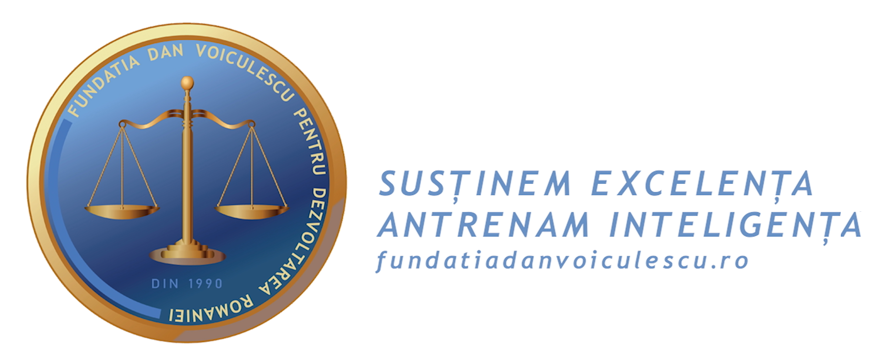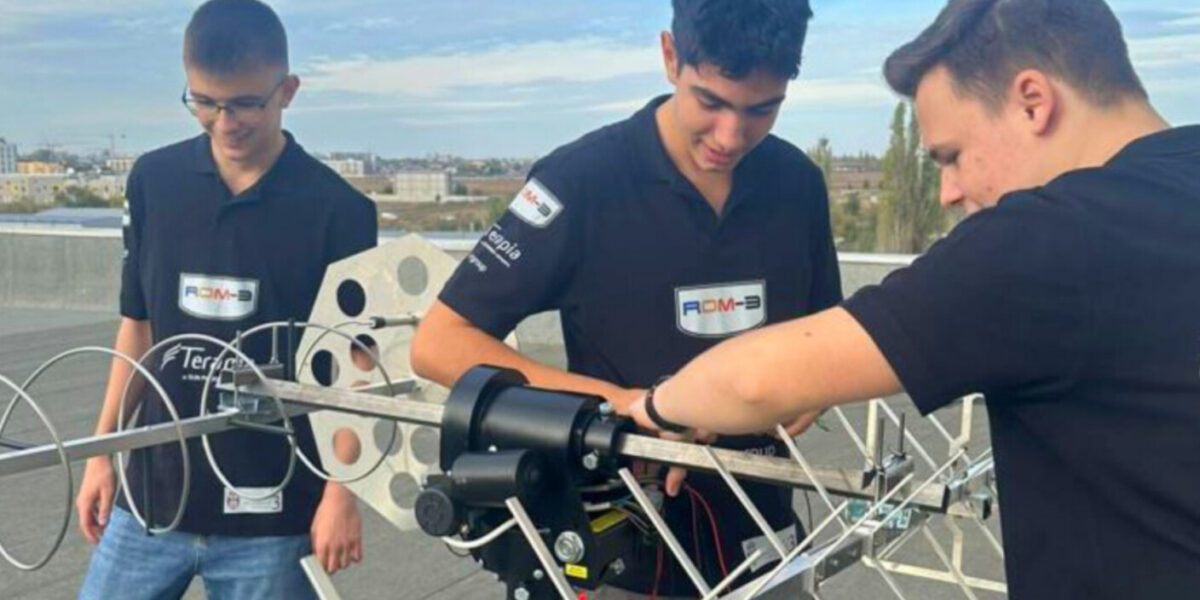In 2023, Romspace - a team of passionate and talented young people - successfully launched the ROM-3 satellite into orbit using a SpaceX rocket provided by Elon Musk. These are scenes many of us see in movies, but also a story that shows us that nothing is impossible when you believe in your dream. The five young people have signed up to the "100 Youngsters for Romania's Development" campaign launched by Dan Voiculescu Foundation for the Development of Romania.
Romspace team. The story that started with a passion for airplanes
Filip Bușcu is in the 11th grade at the International Theoretical High School of Computer Science in Bucharest. His passion for airplanes started as a child. But his desire to explore space was not limited to dreaming from his armchair at home. On the contrary! Filip, along with four of his colleagues, is today writing aerospace history for Romania.
The project started somewhere around the end of grade 7, taking three years to take everything from an idea on paper to the satellite that went into space. And at least 1000 hours invested in research and design, before actually building the first satellite.
What is certain is that the complex mission, called ROM-3, was not only a technological challenge, but also a symbol of the extraordinary potential of young people in Romania.
The Romspace team that completed the ROM-3 mission is composed of students Filip Bușcu, David Ghiberdic, Alex Unteșu, Alesia Unteșu and Alex Peticaru from the International High School of Computer Science in Bucharest and Alex Luchianov, already a scholarship student at the Massachusetts Institute of Technology in the USA.
The data transmitted by the satellite launched into space will be received by the worldwide network of radio amateurs and processed by the Romspace team. An exceptional achievement that marks a significant step forward in our country's space field and brings honour to a new generation of innovators.
Team Romspace or how to conquer space for real
Filip is the project coordinator and engineering manager of the team. All five young people are Olympians and want to study at top American universities. They have all the ingredients to succeed in what they want to do.
What's more, Filip admits that the journey through the whole project has not been easy. They faced many challenges and not everyone initially believed in their dream, knowledge and talent.
That didn't discourage them, but they waited for the right moment to prove that it could be done and that they were the best at what they set out to do.
„We are all Olympians in mathematics, physics, astrophysics, chemistry. We were somewhat up to speed with the basics of the sciences we used in this project. There were at least 1,000 hours invested in research and design before we went on to build the first satellite. After that, we did the second one - ROM3, which was recently launched in November 2023. They are Romania's only satellites that have been functional. The project as a whole involves building small satellites, which are then launched into space. It started as an educational project, and now we plan to expand the project to more sophisticated satellites, in larger numbers, even constellations. I coordinated the whole project, but I was also in charge of the engineering side. I mean, I designed the satellite components, the electrical circuits, the stabilisation systems, pretty much all the engineering. That part was done by me, in collaboration with two other colleagues. On the computer side, I had three colleagues who programmed the satellite, did the transmission system, the on-board picture processing and all the on-board programming. At the beginning, it was very challenging because nobody really believed we could do that. This story started while I was still in middle school, which was four years ago - I'm in 11th grade now.”, says Filip Bușcu.
"For children our age my message would be that nothing is impossible"
Both Filip and his classmates plan to go to top American colleges. They don't reject the idea of returning to Romania, so they can use what they know in their own country.
In aerospace, their dream is big. The 'magnificent five' have big plans. In the future, they plan to open a startup, which they say they would like to become a company that manufactures components or sells solutions for such nanosatellites.
„We started this project towards the end of grade 7 and it took three years to take it from idea on paper to satellite in space. On top of that, we're also the only team without a mentor that has managed to get a satellite into space. We called on people with industry experience, but we didn't have an engineer to guide us through the whole end-to-end process. We had to figure it out ourselves and try a lot of things before the end result came out. I'm planning to go to college in America, both myself and my colleagues. Of the team that previously worked on the ROM2 satellite - which was our first satellite - most of my colleagues are at top American universities. After that, who knows, maybe we'll come back to the country. In the aerospace area, we are planning in the future to open a startup - maybe to become a company that makes components or sells solutions for such nanosatellites. We also have other projects in aerospace, not only on satellites, we are also doing streamlined aircraft. We are expanding into several areas in this area. For kids our age, my message would be that nothing is impossible and that's what we've been saying from the beginning. It's true that there have been a lot of stops in the middle, there have been tests that have failed. And on the funding side, some sponsors didn't trust us anymore, but we found others to help us carry out our mission", the young man continues his story.”, își continuă povestea tânărul.
"What was important is that we didn't give up and managed to make people trust what we do"
The young people say it is extremely important that they never gave up in the face of challenges. In the future, their plan is a truly grand one: for humanity to become a multi-planetary species.
„"It was quite complicated, because we also dealt with the satellite registration part - which is quite a big chapter - to be able to register it with the International Amateur Radio Union, and the first and the second. We could not register the first one in Romania, because the institutions were not really up to speed with this registration process, so we registered it in Spain, with the help of the amateur radio community. We managed to register the second one in Romania. What was important is that we didn't fight and we managed to make people around us trust what we were doing. The ultimate plan is for mankind to become a multi-planetary species and any company that makes communication satellites, rockets - has this ultimate goal - to contribute something to the occupation of other planets or the expansion of mankind to other celestial bodies. It's not something we'll necessarily be able to do, but we're trying to contribute as we can in the future. Obviously, after we finish our studies," Filip Buscu concluded.”, a conchis Filip Bușcu.
"The hardest thing was to gain people's trust, almost nobody believed that a high school team could send a satellite into space. It was a lot of failures and successes that taught us a lot," says Alex Unteșu.
We are the first kids and the first people to launch two functional satellites into space in Romania and we with our high school knowledge wanted to do something unheard of. Among the guys in my team, I am their sister, I also have the nickname SISI, I'm the one who organizes them, puts them to work and tells them "let's get serious", says Alessia Unteșu.
The 5 young people signed up to the "100 Youngsters for Romania's Development" campaign launched by the Dan Voiculescu Foundation
The aim of this campaign is to bring to the forefront the stories and achievements of the most remarkable children and young people in Romania who, through their passion, dedication and talent, have managed to make a name for themselves at national and international level.
The mission of these young people does not stop here, and the team is committed to continuing to explore space and make significant contributions to the advancement of human knowledge.
This achievement not only excites the scientific and technological community in Romania, but also encourages future generations to dream, illustrating the huge potential that young people represent for the development of our country.
Successfully launched, ROM-3, the second Romanian satellite built by students, has reached orbit and is operational.
ROM-3 is currently travelling at a speed of 27,500 km per hour at an altitude of 540 km and circles the planet once every one and a half hours. It crosses Romanian territory twice a day.
The data it transmits on 436.235 MHz will be received by the worldwide amateur radio network and processed by the Romspace team. ROM-3 has missions to observe the Earth, measure its own parameters, measure the Earth's magnetism and the level of cosmic radiation hitting the atmosphere.
The first catalogue of Romanian excellence. Who are the 100 Youngsters for Romania's Development
The Campaign "100 Youngsters for Romania's Development" aims to discover 100 talented and high-performing children and young people to award on 1 December 2024 in a gala of excellence. Anyone can submit a proposal on www.fundatiadanvoiculescu.ro.
Whether we are talking about academic excellence, artistic performance, social involvement or innovation in various fields, these young people are true ambassadors of Romania's extraordinary potential.
The catalogue of Romanian excellence will include international Olympians, winners of various international and national competitions (gold, silver and bronze medals). The campaign will showcase inspirational role models, proudly illustrating the diversity of talent across the country.
The 100 young people will be selected from the following categories:
- Education
- Sports
- Culture
- Innovation
More details about the "100 Youngsters for Romania's Development" campaign: https://fundatiadanvoiculescu.ro/campania-100-de-tineri-pentru-dezvoltarea-romaniei/

